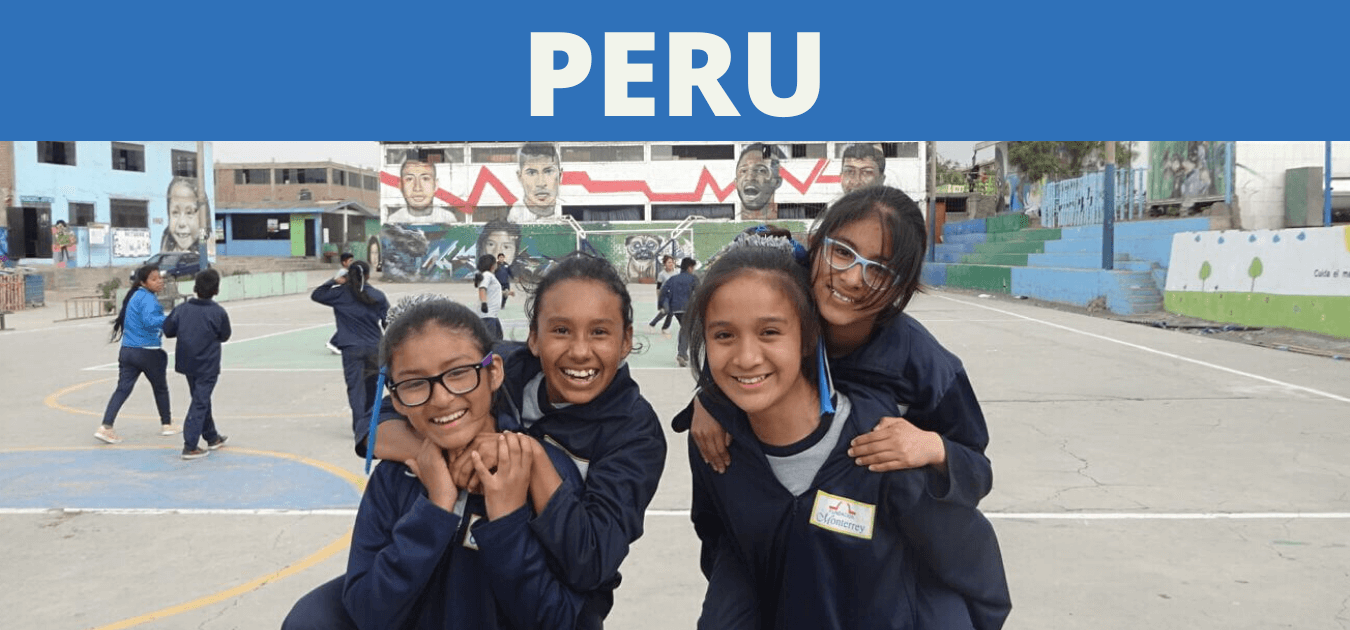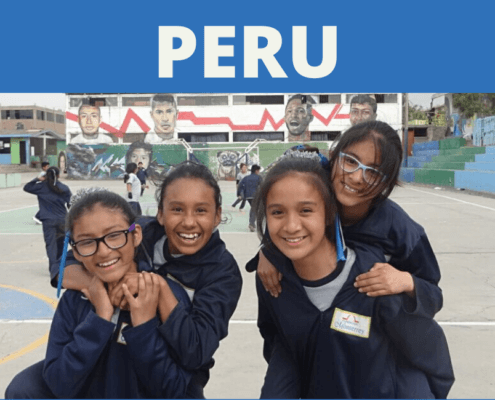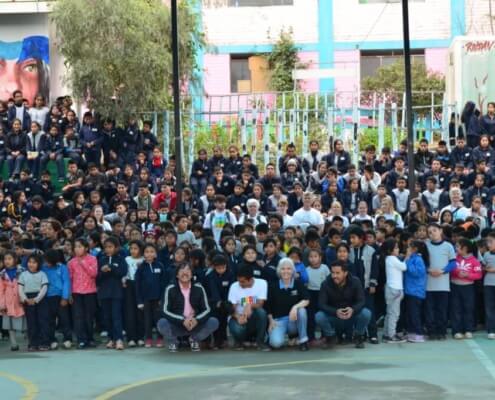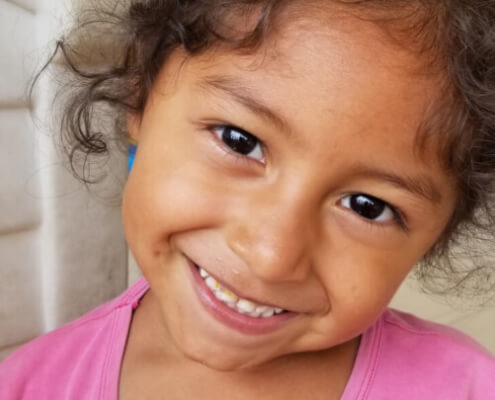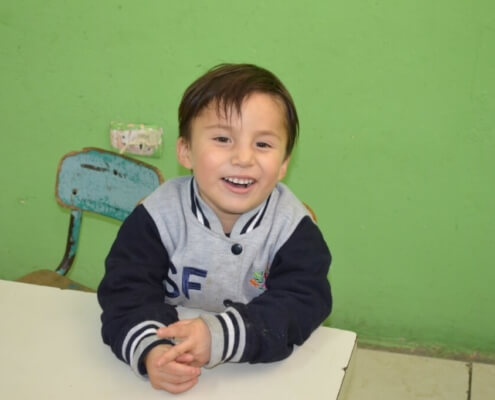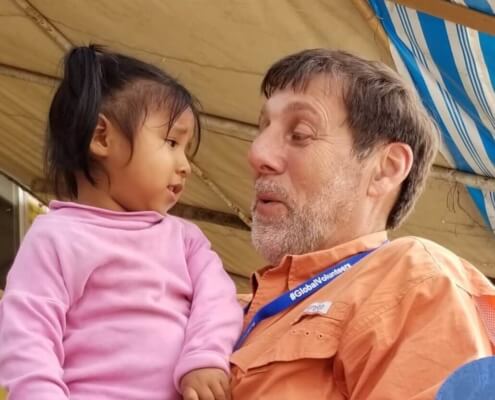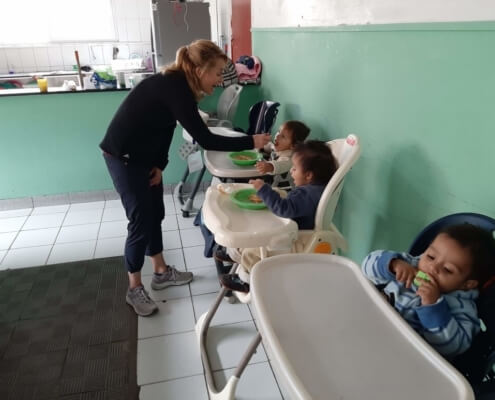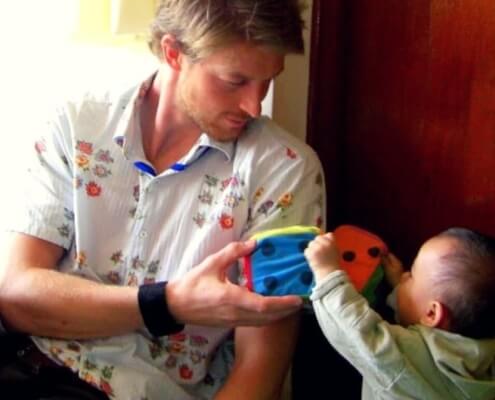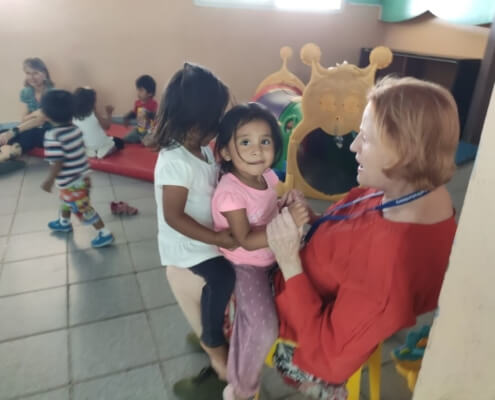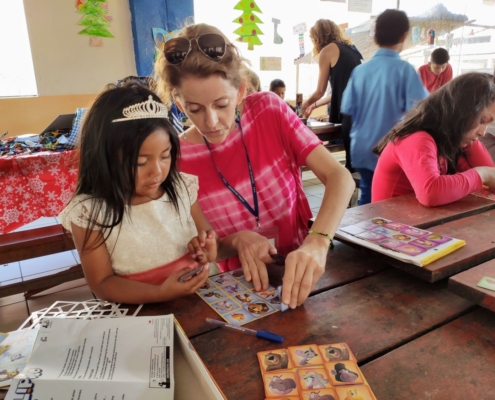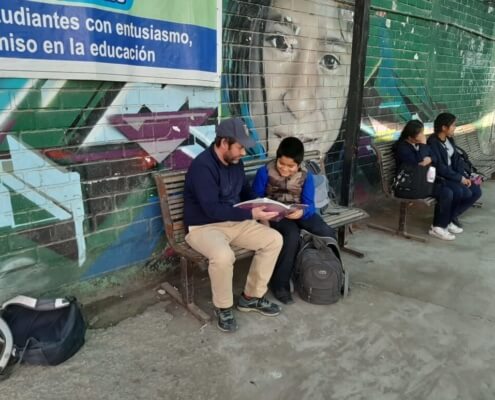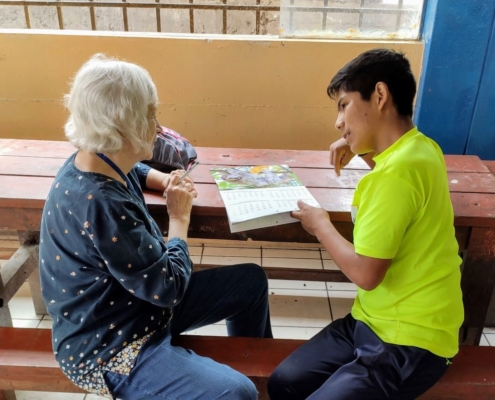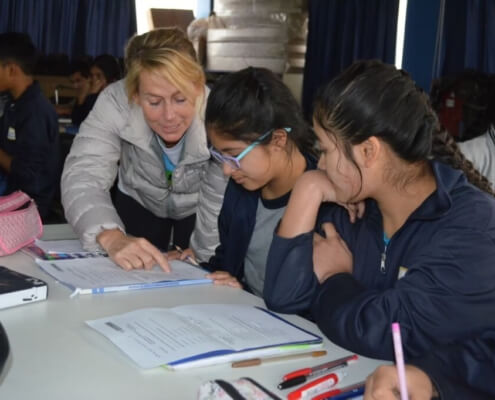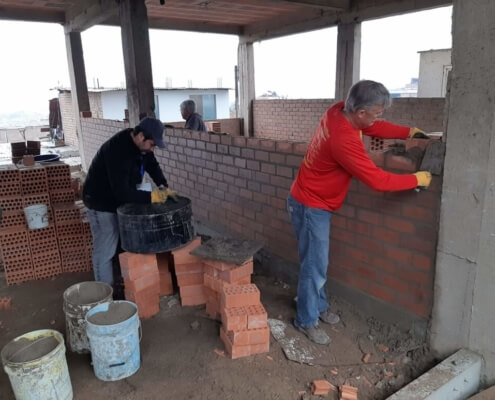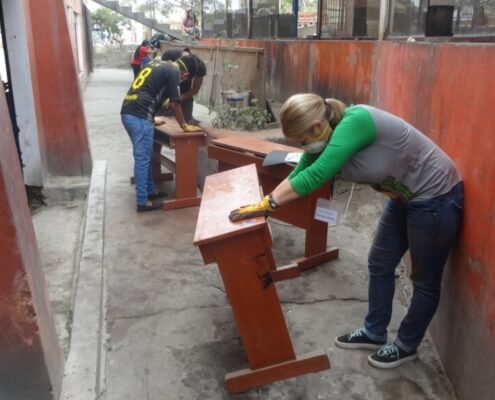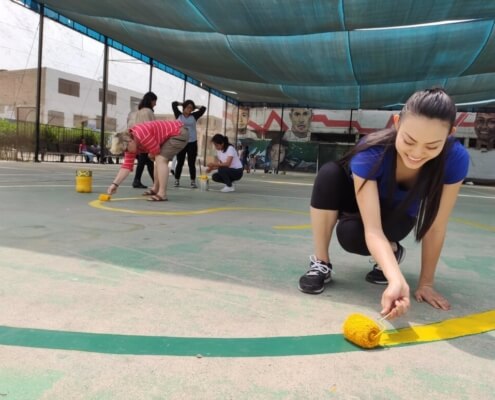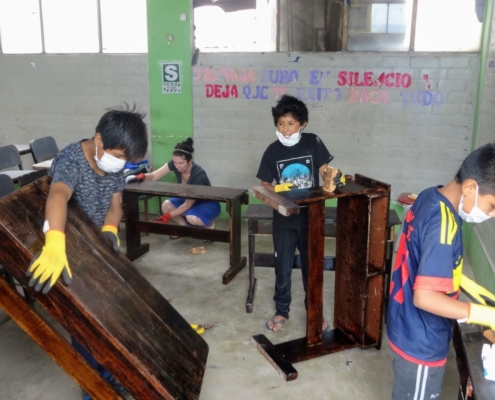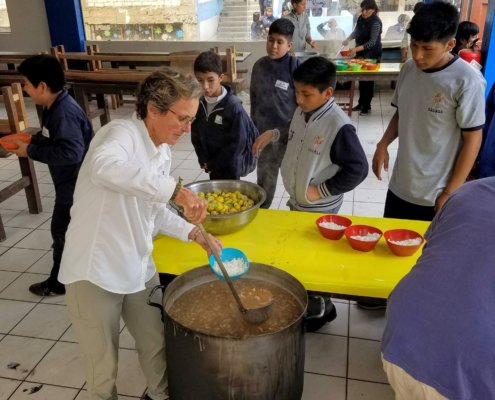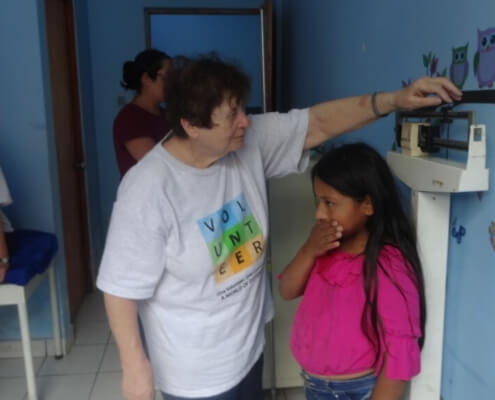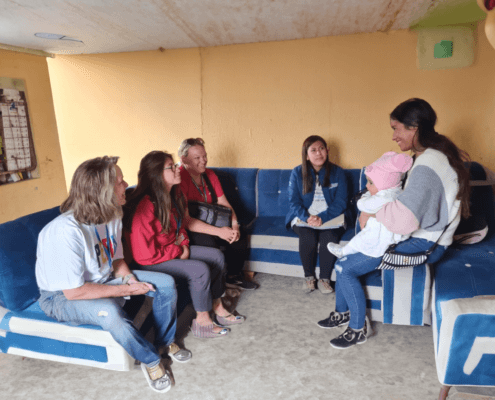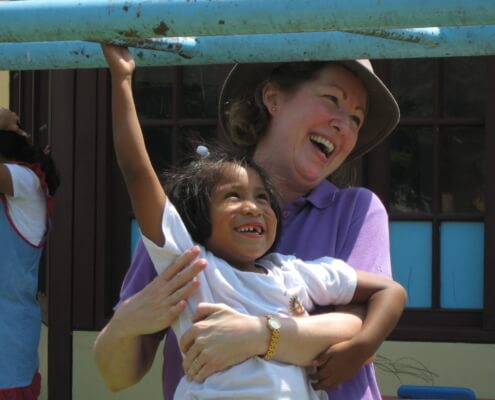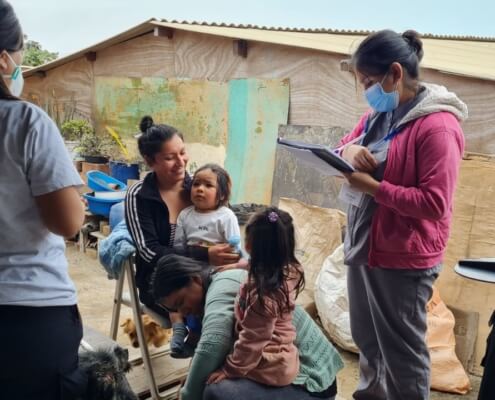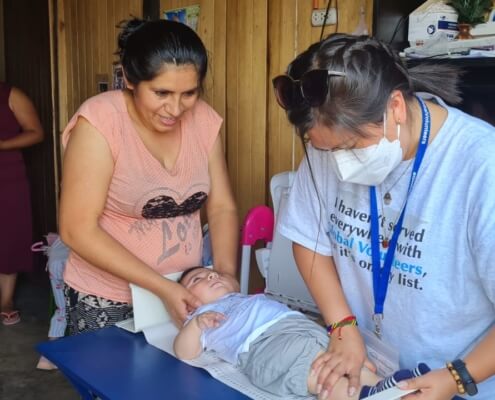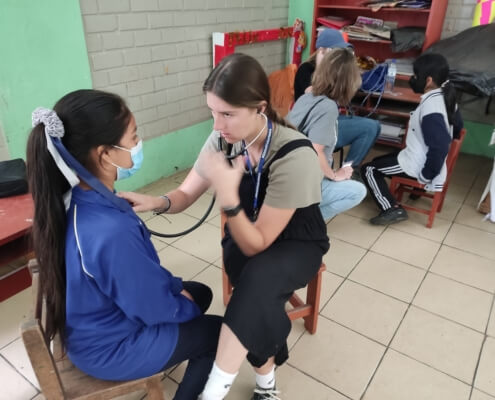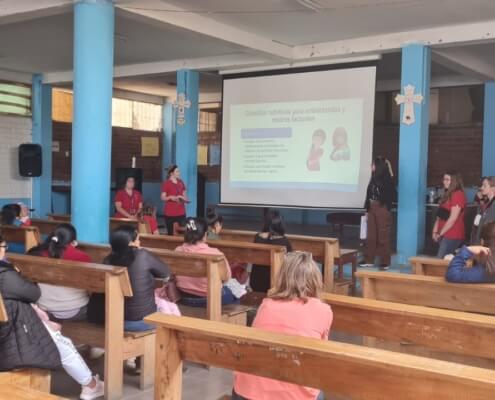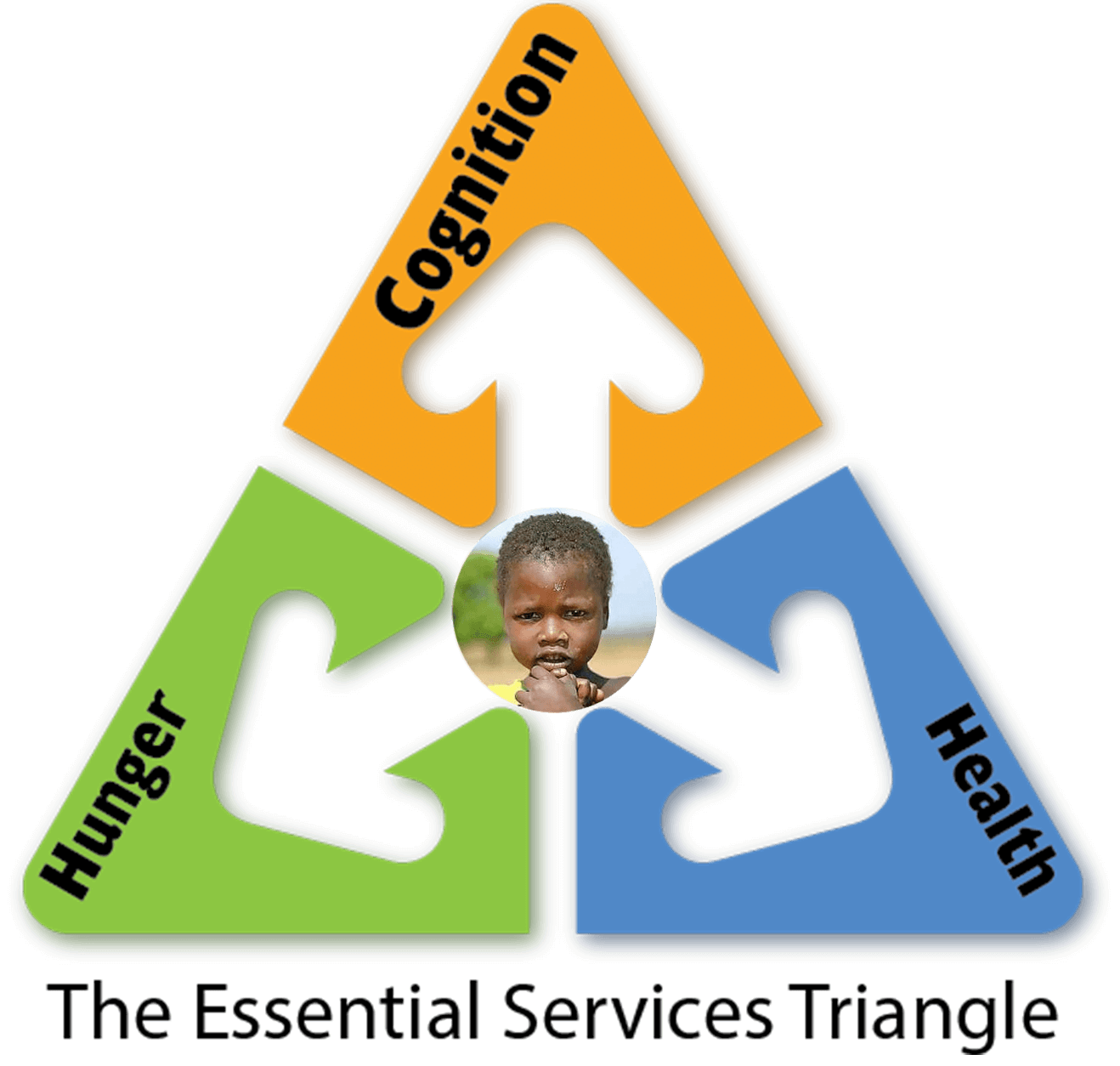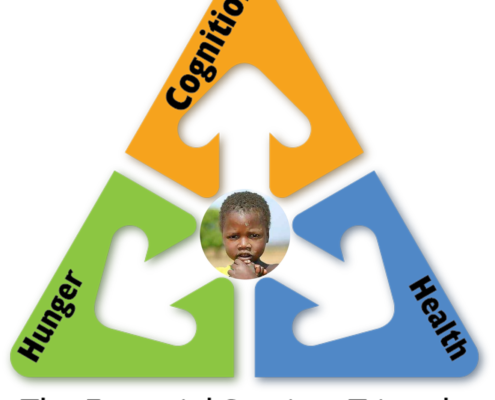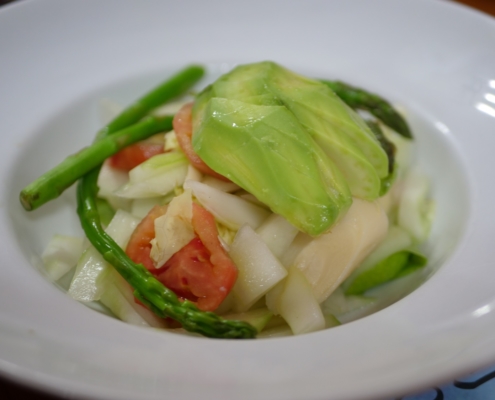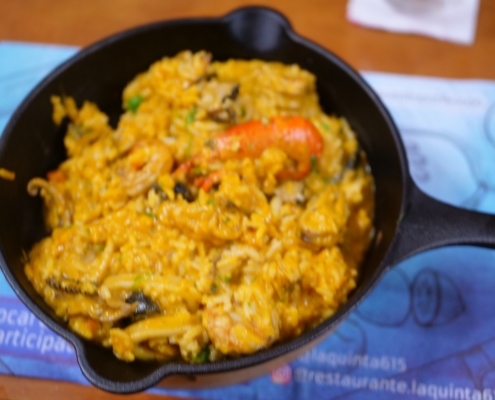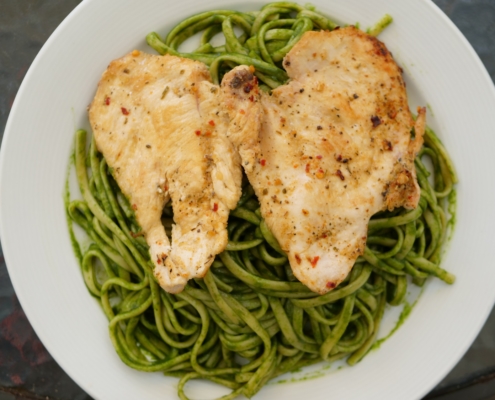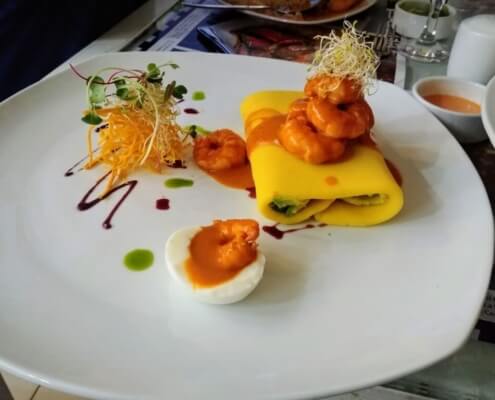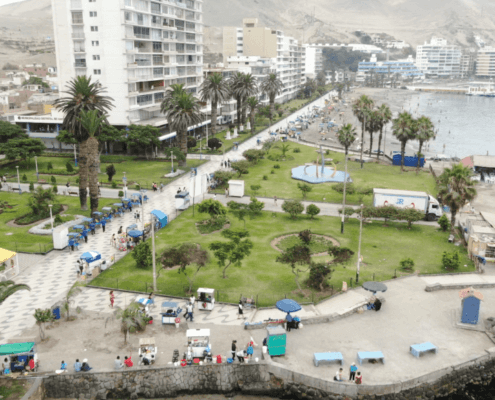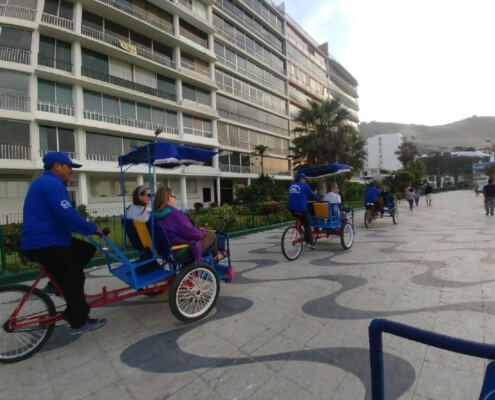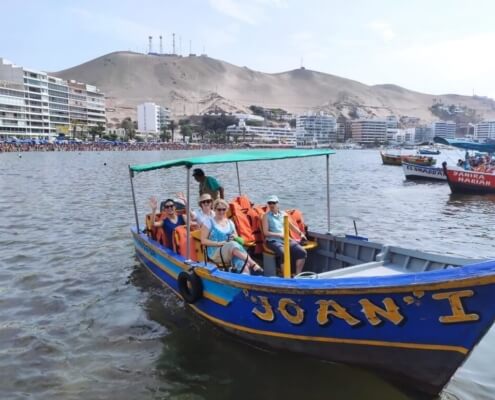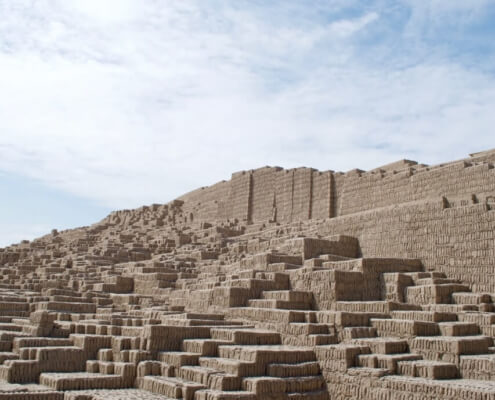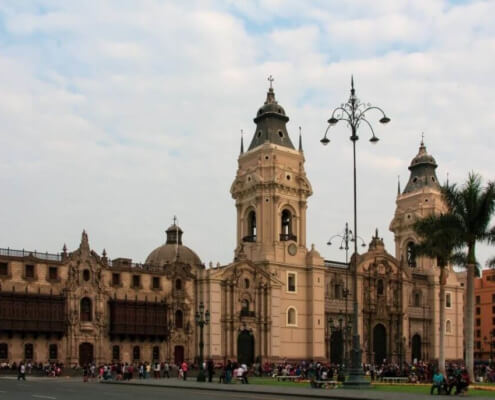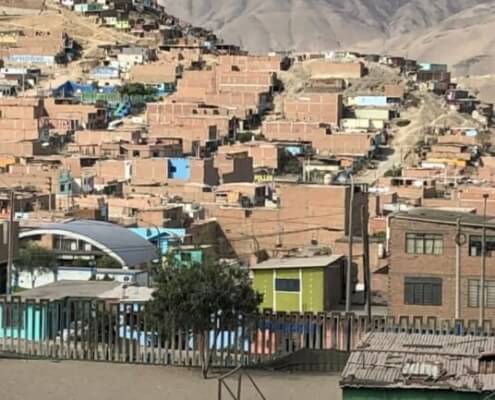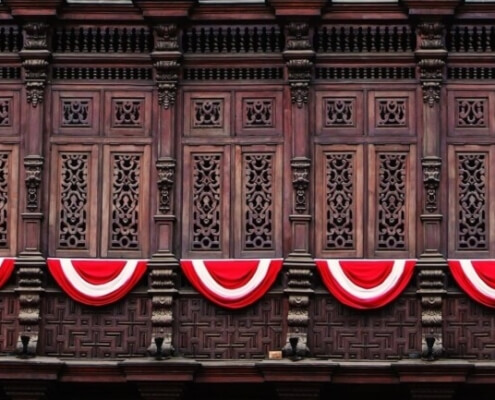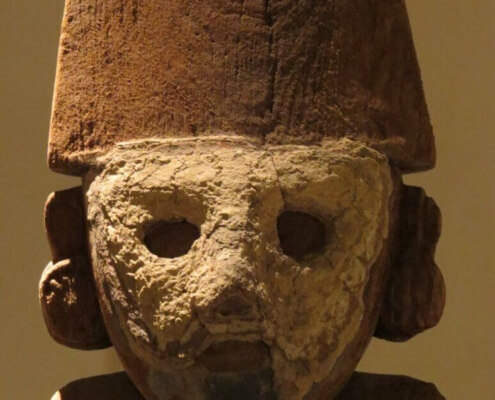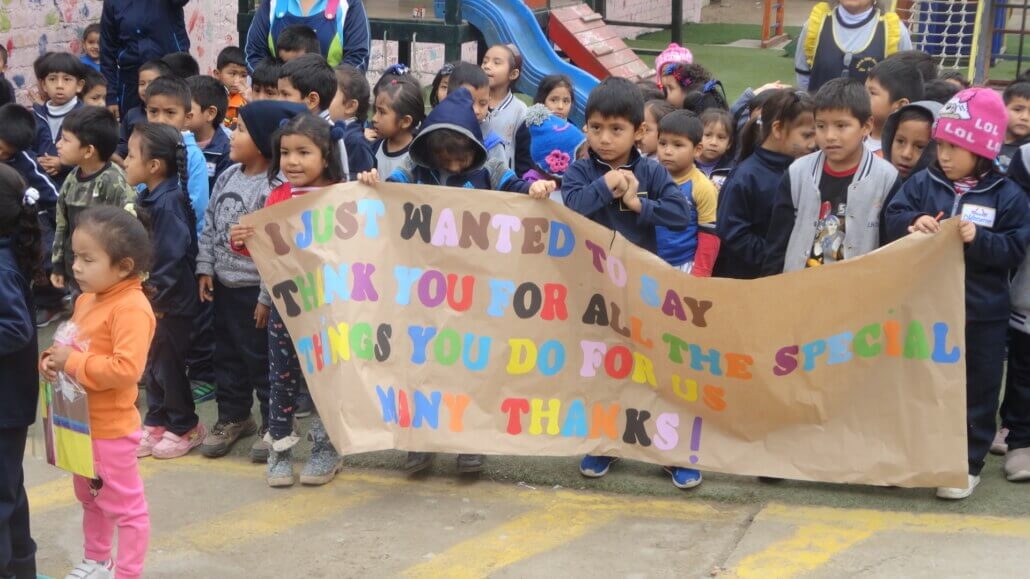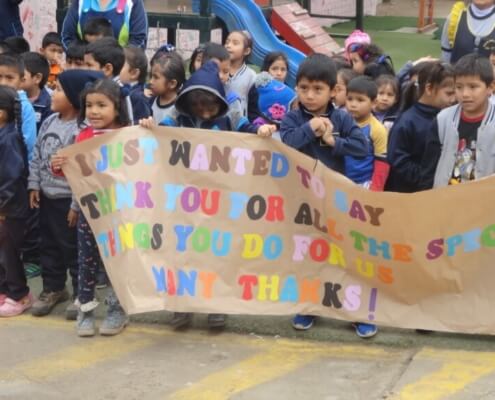Serving in Peru
Lima is a cosmopolitan, bustling city combining the very best of Latin culture: vibrant music and dance, delicious cuisine, engaging historical traditions, expressive language, and so much more. Peru is one of Latin America’s most ethnically diverse countries and is rich in Hispanic and indigenous cultures. Global Volunteers has been invited by Peruvian organizations based in Lima to help in these important ways:
- Care for, nurture, and teach preschool children.
- Work on labor projects to improve living and learning spaces.
- Teach conversational English to children from kindergarten through high school.
- Conduct interactive workshops for parents on health, nutrition, early childhood development, education, psychology, or related topics.
- Accompany our caregiver staff on family home visits to reinforce workshop lessons.
- Help with health care projects at the on-campus clinic, when requested. The clinic serves all of the 1,300 children of the community and people from the surrounding community.
If you want to invest in youth’s growth and development, invest your skills for a week or two and make a lasting difference.
Community Partner & Work Projects
La Comunidad de Niños Sagrada Familia
“Sagrada Familia” (Sacred Family) is a shelter for vulnerable children who otherwise have nowhere to go. The goal of this community is to care for and protect children who have been left homeless or neglected by giving them the love, care and individualized attention that all children need and deserve. Sagrada Familia is located in Ventanilla, which is in the outskirts of Lima. The shelter feeds, nurtures, and educates over 1,200 children aged birth to seventeen who have been abandoned, orphaned, or who have faced abusive or otherwise dangerous family environments. Many of these children come from the most destitute parts of Peru, such as the bursting settlements that sprawl into the hills along the city’s edges.
Sagrada Familia functions as a small village or community for the children in need. In addition to the facilities one would expect to see at a children’s home (dormitories, dining halls, sports courts, etc.), the community provides education for all children (preschool to high school), a trade school (bakery, carpentry, music and sewing), workshops, and a health clinic.
For more than 25 years, thousands of children have called Sagrada Familia home, and have benefited from the life-changing care they have received there. While many former students continue to support Sagrada Familia after they leave, the community needs help in all areas. This is a wonderful opportunity for you to help provide the essential services every child needs to thrive. Volunteers from all backgrounds are welcome.
Student Workshops
Skilled volunteers can assist with student workshops in carpentry, welding, sewing, and baking.
High school students have workshop classes everyday Monday – Friday from 12:05 to 5:55 with a one-hour break for lunch at 1:00 pm. Workshops consist of both theory and practice lessons. Volunteers can help students with their workshop projects. Volunteers who plan to assist with carpentry or welding workshops must wear appropriate clothing (long pants, boots) and must bring their own protective gear (work gloves, masks, and safety glasses).
Childcare
The Peruvian culture of enjoying life to the fullest is evident in the smiles of the children we serve. One of the most important contributions you can make is to provide childcare at Sagrada Familia. Infants and toddlers need loving hearts and steady arms to hold, nurture, and feed them; help them with their first steps; and play the games that allow their socialization and language skills to progress. Volunteers also provide the older children and youth with much-needed attention and psychosocial support by teaching new games, playing sports, helping them with their studies and demonstrating arts and crafts.
Teaching conversational English
Like all Peruvian students, the children with whom we work must study English, which is seen as a necessary tool to rise out of poverty. However, there are far too few English teachers for all the children. Volunteers are instrumental in offering these students real-life practice to help them improve their English language skills which one day will help qualify them for better jobs. Any native English speaker can be of service; no classroom experience is required. We provide each volunteer with a comprehensive Conversational English Teaching Guide which includes lesson plans, engaging activities, tutoring tips, English songs, etc.
Light Labor Projects
For volunteers who like to roll up their sleeves, there are always several pressing light labor projects that require immediate attention at Sagrada Familia to ensure the children have adequate living conditions. Painting, carpentry, renovations, and general building maintenance are just a few examples. Highly skilled people are always needed, but if you can wield a paintbrush or pound a hammer, you can be helpful.
Other needs include gardening, washing and folding children’s clothes, and cleaning and maintaining the dormitories. There is always something that needs to be fixed, mended, or painted!
Other Ways to Help at Sagrada Familia
- Offer psychosocial support to needy children. Most of these children come from impoverished families, and many struggle with self-confidence and self-esteem. Your help has been requested to engage in activities that will help these children. Help build, paint, and repair community facilities and playgrounds.
- Assist students with English language activities.
- Lead workshops related to music, baking, sewing, and carpentry.
- Help prepare daily meals in the kitchen for students and staff.
- Teach life readiness and occupational skills to young adults poised to live on their own.
- Participating in the Reaching Children’s Potential Program.
Reaching Children’s Potential Program
Global Volunteers is taking the lead in preventing — and eventually eliminating — childhood stunting. Started in the Ukwega Ward of Tanzania in 2017, the RCP Program is now replicated in Ventanilla, Peru. At the invitation of our host, Sagrada Familia, Global Volunteers engages volunteers to help conduct the Reaching Children’s Potential (RCP) program. Ventanilla is one of the poorest districts in Lima. An urban area that is very densely populated, residents often live in small houses built of salvaged materials and lack necessities like running water. Numerous children suffer from preventable health conditions often related to poor nutrition and poor sanitation including anemia and chronic malnutrition or stunting.
The RCP program is a child-focused, holistic effort that begins with pregnancy and continues through the 18th birthday. By providing parents and caregivers the necessary knowledge and appropriate technology, and the support and encouragement to apply the knowledge and adopt the technology, the devastating effects of stunting can be prevented, and eventually, eliminated.
The first 1,000 days are foundational and the most important time in all human life. It is essential that pregnant women and children receive sufficient food and nutrition and are protected from infectious disease during these vital 1,000 days. In order for parents to be able to adequately provide for their children during this critical time, they need knowledge, appropriate technology, and support. Short-term volunteers help parents deliver essential services to their children. Currently volunteers are needed to:
- Conduct interactive workshops with pregnant women and parents of children two years and younger. These workshops provide knowledge and appropriate technology necessary so parents can ensure the health and well-being of their infants and toddlers. Workshops are conducted on a variety of topics related to food, nutrition, and disease prevention, e.g., staying healthy during pregnancy, breastfeeding, growing fruits and vegetables, preparing nutritious meals, washing hands with soap and water, etc.
- Accompany Global Volunteers’ local staff on weekly home visits. The primary purposes of the home visits are to:
- Help parents apply the new knowledge learned at the workshops, e.g., review nutrition, hygiene, and early childhood development guidelines; present information about available resources; etc.
- Demonstrate the use of appropriate technologies, e.g., handwashing stations etc.
- Offer support and encouragement to parents so they can make the behavioral changes necessary to apply the knowledge and adopt the technologies.
- Show parents how to communicate with and stimulate their infants and toddlers.
The Essential Services
At the center of community development is Global Volunteer’s Essential Services Triangle. These are the 12 essential services, prescribed by the United Nations, which every child needs to realize the fullness of their potential. Global Volunteers organizes these services into three major categories – Eradicating Hunger, Improving Health, and Enhancing Cognition.
HUNGER
- School and household gardens
- Child nutrition
- Micronutrient supplementation
- Improved stoves
HEALTH
- Health, nutrition, and hygiene education
- Malaria and dengue fever prevention
- Deworming
- HIV/AIDS education
COGNITION
- General education
- Promoting girls’ education
- Potable water and sanitation facilities
- Psychosocial support
Global Volunteers is committed to supporting our community partners in these 12 areas through the sustained, comprehensive assistance of an ongoing stream of short-term volunteers and direct project donations from volunteers and supporters worldwide. Our focus is on pregnant women and their children. Depending upon the needs of the host community and the community-based projects requested by local people, Global Volunteers helps deliver some or all of the 12 services. Every volunteer can help in one or more of these 12 interventions. As a short-term volunteer, you’re a vital component in helping families and local community organizations deliver these essential services to their children.
Service Program Logistics
Global Volunteers Peru Team Leader, Diego Acosta Ruiz, leads all teams in Peru. In cooperation with our community partners, Diego facilitates your team’s orientation, assists you in being fully engaged in your assigned work project(s), and manages all project-related logistical issues. Deigo is a Senior year Administration and Entrepreneurship Management student at Universidad Peruana de Ciencias Aplicadas (UPC), and is also an Audio Engineer (School of Audio Engineering – SAE Institute Madrid) and audio producer (Middlesex University London). He is bilingual (Spanish and English) and served as our translator from 2019 to 2020. Diego will introduce you to the community, help acclimate you to the local culture, invite you to community events, and engage you in the day-to-day life of the community.
Meals
Three meals a day are included in the service program contribution and your team leader organizes all the logistics. Peru is considered the capital of gourmet fare in South America and is known worldwide for its varied and delicious cuisine. A delicious breakfast is served every day at the hotel. Lunch is typically served at the community you are working and dinner is at excellent local restaurants. Peru is home to jungle, alpine mountains, coastal plains, and the Pacific Ocean, so all types of fresh foods are available. Lomo saltado (sautéed beef), pollo a la brasa (Peruvian-style rotisserie chicken), and causa (a traditional Peruvian dish made with potatoes and yellow peppers) are just a few of the wonderful local dishes you will have the chance to try. A local favorite is ceviche, which consists of fresh fish, scallops, or shrimp marinated in chili peppers and lime juice, whose acidity “cooks” the seafood. Other Peruvian meals feature a wide variety of tropical fruits, vegetables, seafood, and meat. Desserts, soft drinks, and alcoholic beverages are readily available for an additional charge.
Lodging
Volunteers stay at a comfortable, family-owned and operated hotel in the quaint beachfront community of Ancon. All rooms are double occupancy and single rooms are available for an additional fee. Each room comes with a private bath, TV and Wi-Fi. Hot water is available 24/7. The community of Ancon is a fishing village and summertime destination for Peruvian families taking advantage of miles of sandy beaches, pedestrian boardwalks and other seaside amenities.
Transportation
All in-country transportation is included in your service program contribution. A Global Volunteers representative will meet you at the Jorge Chávez International Airport (LIM) on the service program arrival date and transport you to the hotel. You will also be driven to the airport on the last day of the service program. Volunteers serving at Sagrada Familia will take taxis to the children’s home daily, a 30- minute ride.
Note: Transportation for free-time activities is not included.
Program Mobility
Our program in Peru requires volunteers to be mobile for the following reasons:
- Volunteers in Peru are transported in passenger vans. Volunteers must be able to climb in and out of passenger vans unassisted.
- The Sagrada Familia campus within Ventanilla is expansive. Therefore, volunteers must be able to walk at least .5 miles over uneven paved terrain, including some sloped areas or small hills.
- Volunteers stay in a hotel that may require them to climb at least 2 flights of stairs with their luggage.
Free Time Activities
In the evenings and on weekends, you have free time to explore this enchanting culture, the largest of the Andean countries. A top destination for many people visiting Peru is Machu Picchu, the mystical Incan city nestled high in the peaks of the Andes Mountains. Located 43 miles northwest of Cusco (the oldest continuously inhabited city on the continent), Machu Picchu was built in the late 1400s, and is a maze of 200 buildings, mostly residences, temples, and storage facilities. Buildings were constructed of granite block upon granite block – without mortar! With the decline of the Inca Empire, Machu Picchu became a forgotten site, only to be rediscovered in 1911. It remains a haunting and mystical destination. When considering a trip to Machu Picchu, please note it requires long travel days including air travel to Cusco from Lima and significant altitude changes. While possible to do this trip on a weekend, we do not encourage it – there just isn’t enough time. Most volunteers who visit Machu Picchu do so after the service program to allow sufficient time for exploration.
Other free time opportunities include visiting Lima’s restored colonial center and many museums, markets, and cafés. The Pacific Ocean hugs the entire southwestern edge of the district of Miraflores, which you can visit on the middle weekend. You can walk for miles along the boardwalk that overlooks the water crashing on the cliffs below. Volunteers can visit different neighborhoods throughout Lima, exercise (running, yoga, tennis, swimming), or go to the Indian or Inca Market where artisans sell clothing, arts, and crafts from different Peruvian regions. You can also visit unique sites around Lima, like the Nazca lines, the ancient city of Caral (the oldest civilization in the Americas, dating back 5,000 years), Paracas Peninsula, or the Ballestas Islands. If you enjoy waterfalls and nature, you can take a two-day trip to La Merced, a beautiful town located about six hours from Lima. You will never be at a loss for something to do in Peru!
Places to visit & attractions in Ancon – Ancon is no longer only a spa and beach resort but transformed in the last years to a modern city that has its visitor lots to offer: The stunning and beautiful Pacific Ocean just in front of it, Ancon’s “Malecon” (costal road) and beautiful mansions from the 19th and 20th century are combined with modern buildings. You can also visit the Plaza de Armas (the main plaza/square), Museum of Archaeological Investigations for the amazing findings of the pre-Hispanic cultures or take a boat trip to the 13 islands offshore known as “Grupo Pescadores”. Each island is a permanent or temporary home for many marine birds like Peruvian Gull, Guanay Cormorant, Red-legged Cormorant, Inca Tern, Brown Pelican and more.
Service Program Contribution
Global Volunteer’s service program contribution covers all lodging in comfortable double occupancy accommodations, three meals a day, in-country team transportation, emergency medical evacuation insurance, all preparatory materials, onsite orientation, a full-time team leader, and program and administration costs. The service program contribution is $2,776 for one week and $2,991 for two weeks. (Single rooms are available on a first-come, first-served basis for an additional fee – $140 for one week; $280 for two weeks.) Please ask your Volunteer Coordinator about discounts for students, companions, alumni, and children under the age of 12 with an accompanying adult; and referral credits. If finances are an issue, we can help you use our online fundraising tool where you can create a personalized webpage to request partially tax-deductible donations from family and friends to help cover your service program contribution. Airfare and free time activity expenses are your responsibility. The service program contribution and airfare are tax-deductible for U.S. taxpayers.
Upcoming Volunteer Dates in Lima, Peru
Reserve your spot today. Call one of our volunteer coordinators at 800-487-1074 to register.
You CAN make a world of difference!
